Blackbirds are a common nuisance, causing damage to property and posing a threat to public safety. However, you may be surprised to learn that directly interfering with these birds is often illegal due to the Migratory Bird Treaty Act. This federal law protects blackbirds, making it crucial to focus on prevention rather than removal.
In this comprehensive guide, we’ll explore a range of effective ways to keep black birds away from your property using humane and legal methods. From eliminating potential food sources to utilizing innovative bird deterrents, you’ll discover strategies that can help you reclaim your outdoor spaces without harming the protected blackbird population.
Key Takeaways
- Blackbirds are protected by federal law, making direct removal difficult and illegal
- Prevention is the key to keeping black birds away, focusing on removing food sources and eliminating perching opportunities
- Humane deterrents like the WhirlyBird Repeller can effectively scare off blackbirds without causing harm
- Invasive species like European Starlings and House Sparrows can also be discouraged through targeted methods
- Consistent monitoring and maintenance are essential for long-term success in keeping black birds away
Understanding the Problem with Blackbirds
Blackbirds, including grackles and starlings, can pose significant problems for homeowners and property owners. These birds, known for their large numbers and aggressive behavior, can cause extensive damage through nesting, roosting, and fouling of various structures.
Why Blackbirds Can Cause Damage to Property
Blackbirds are notorious for their tendency to nest in gutters, causing blockages and potential water damage. Their roosting habits can also lead to the accumulation of droppings on roofs, windows, and other surfaces, creating unsightly and potentially hazardous conditions. The sheer volume of blackbirds in some areas can overwhelm the capacity of these structures, leading to further problems.
Legal Restrictions on Removing Blackbirds
It’s important to note that blackbirds are protected by the Migratory Bird Treaty Act, a federal law that prohibits the killing, hunting, or manipulation of nests of migratory bird species, including blackbirds. This means that homeowners and property owners cannot simply remove or destroy blackbird nests without obtaining the proper permits and following the necessary legal procedures.
Failure to comply with these regulations can result in significant fines and other penalties. Understanding the legal restrictions is crucial when addressing blackbird issues, as it determines the course of action that can be taken to mitigate the problem effectively and legally.
“Blackbirds can be a persistent and destructive pest, but it’s essential to address the issue within the boundaries of the law to avoid legal consequences.”
By being aware of the challenges posed by blackbirds and the legal constraints surrounding their management, property owners can take proactive steps to prevent and minimize the impact of these birds on their property. The next section will explore the importance of prevention and effective strategies to keep blackbirds at bay.
The Importance of Prevention
When it comes to dealing with blackbird infestations, prevention is often the best approach. Since direct removal of these birds may not always be a viable option, the focus should shift to making your property less appealing and less inviting to them. By taking proactive blackbird deterrence strategies, you can effectively discourage blackbirds from taking up residence on your property in the first place.
Avoiding Blackbirds Through Proactive Measures
The key to preventing blackbird infestations lies in eliminating the factors that attract them to your area. This includes removing potential food sources, limiting perching opportunities, and using various deterrents to keep them at bay. By implementing a comprehensive proactive bird prevention plan, you can significantly reduce the chances of dealing with a blackbird problem in the future.
One of the most effective ways to deter blackbirds is to eliminate food sources that may be attracting them to your property. This can involve tasks like regularly cleaning up fallen fruit or berries, pruning overgrown bushes and trees, and properly storing trash and pet food. By making your yard less appealing to blackbirds, you can discourage them from taking up residence.
In addition to removing food sources, it’s also important to limit the number of potential perching spots on your property. This can be achieved by covering or removing structures like fence posts, ledges, and tall trees that blackbirds might use as roosting sites. By making your yard less hospitable for these birds, you can effectively deter them from settling in.
Finally, the use of various deterrents can be a valuable tool in your blackbird deterrence strategies. This can include the use of visual, auditory, or physical deterrents, such as reflective devices, noise-making devices, or physical barriers. By employing a combination of these proactive measures, you can create an environment that is less attractive to blackbirds, ultimately helping to prevent blackbird infestations on your property.
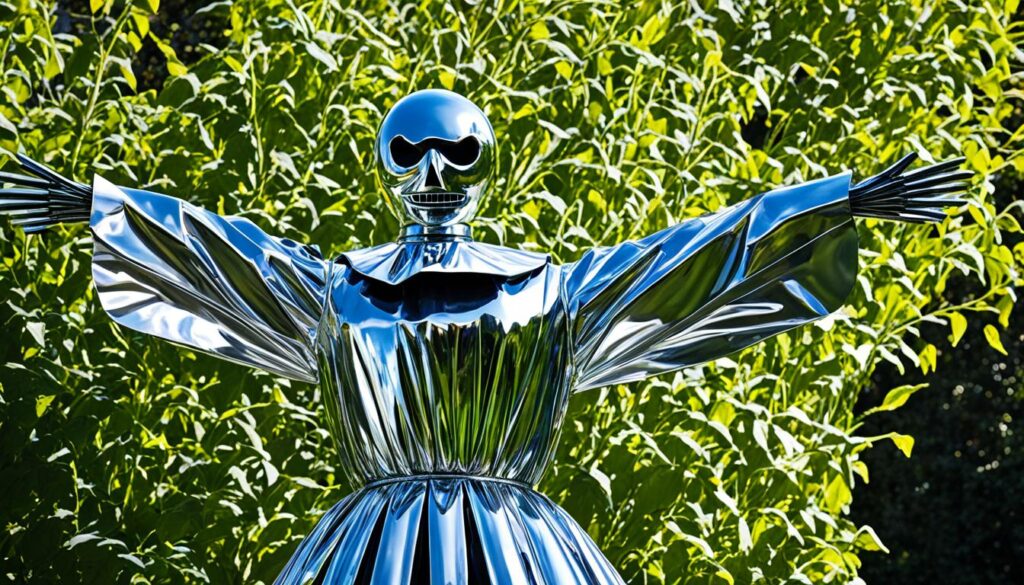
“Proactive prevention is the key to effectively dealing with blackbird infestations. By making your property less attractive to these birds, you can significantly reduce the chances of having to confront a problem in the first place.”
Remove Potential Food Sources
Blackbirds are drawn to readily available food sources, such as wild berries and fruit growing on your property. To discourage their presence, it’s vital to remove these potential food sources by regularly pruning and maintaining your landscaping. This includes eliminating any wild berry bushes or holly trees that may be providing sustenance for blackbirds.
Eliminating Wild Fruit and Berries
Wild berries and fruits are a major attraction for blackbirds. Take the time to survey your property and remove any berry bushes or fruit-bearing trees that could be feeding the blackbirds. This proactive step can significantly reduce the food sources that draw them to your area.
Pruning Holly Trees and Bushes
Holly trees and bushes are another common food source for blackbirds. Their bright red berries provide an appealing meal for these birds. Regularly pruning and maintaining your holly plants can eliminate this food source and discourage blackbirds from congregating on your property.
By removing blackbird food sources, such as wild fruit and berries, as well as pruning holly trees and bushes, you can make your property less appealing to these birds. This is an essential step in your overall strategy to remove blackbird food sources and eliminate wild fruit and berries to discourage their presence.
Eliminate Perching Opportunities
Blackbirds are known to prefer elevated perching spots, such as fence posts, to survey their territory. To discourage these pesky birds, you can cover potential perching areas with deterrents. Installing physical barriers like spikes or other obstructions on fence posts can effectively eliminate blackbird perches and discourage them from roosting in your yard.
Covering Fence Posts with Deterrents
One effective way to eliminate blackbird perches is to cover your fence posts with deterrents. You can use a variety of products, such as bird spikes or other physical barriers, to make the posts less appealing to blackbirds. These deterrents create an uncomfortable and unsafe environment for the birds, encouraging them to seek alternative nesting and roosting locations.
Using Balloons for Temporary Deterrence
In addition to physical barriers, you can also use balloons to temporarily deter blackbirds. Placing Mylar or reflective balloons near areas where blackbirds may try to roost can be an effective and affordable solution. The unpredictable movement and reflective nature of the balloons can scare away the birds, providing a short-term deterrent until a more permanent solution can be implemented.
- Install bird spikes or other physical barriers on fence posts to eliminate blackbird perches.
- Use Mylar or reflective balloons near potential roosting areas to temporarily deter blackbirds.
- Combine multiple methods, such as deterrents and balloons, for a more comprehensive approach to keeping blackbirds away.
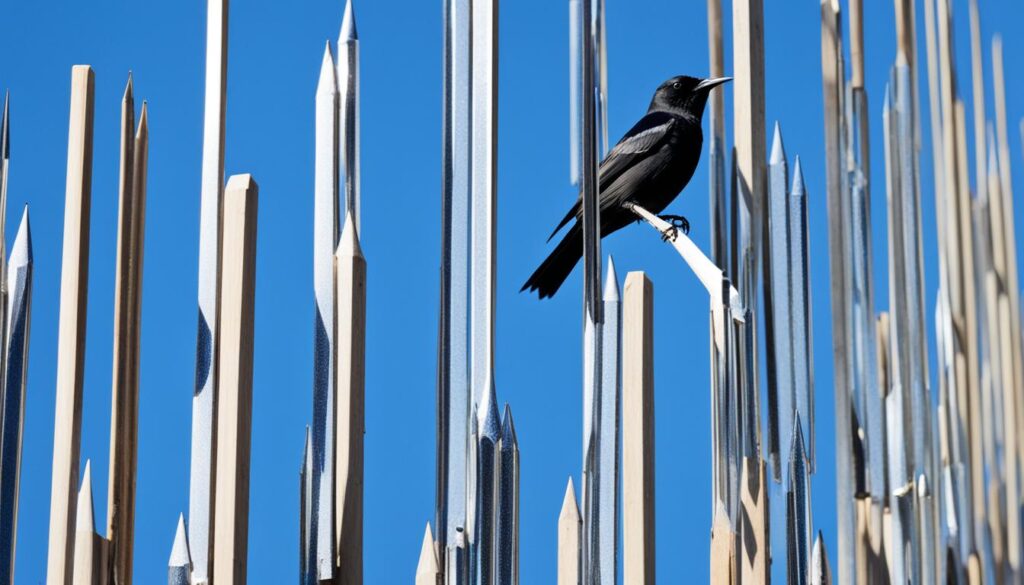
“Blackbirds are persistent, but with a combination of deterrents and proactive measures, you can effectively eliminate their presence in your outdoor spaces.”
Create Barriers Around Gardens
If you have a garden or other areas where blackbirds may be attracted, consider setting up physical barriers to deter their access. Interlocking string barriers can be an effective and inexpensive way to create a deterrent around your garden, discouraging blackbirds from landing and accessing any potential food sources.
Interlocking String Barriers
To create an interlocking string barrier, you’ll need sturdy string or fishing line, and stakes or posts to secure the barrier. Start by setting up a perimeter around your garden, spacing the stakes or posts about 10-15 feet apart. Then, run the string or fishing line between the posts, creating a criss-cross pattern that forms a physical barrier.
- The interlocking strings should be placed close enough together, about 6-8 inches apart, to discourage blackbirds from attempting to fly through the barrier.
- Ensure the strings are taut and secured firmly to the posts or stakes to maintain the barrier’s integrity.
- Consider using reflective or brightly colored string to enhance the visual deterrent for blackbirds.
This simple yet effective interlocking string barrier can help protect your gardens from blackbirds and other unwanted bird visitors, preventing them from accessing your plants and produce.
“Birds are sensitive to objects that resemble eyes, making scarecrows more effective if they have large, wide-open eyes visible.”
By combining physical barriers with visual deterrents, you can create a multi-layered approach to keep blackbirds away from your garden and maintain the health and productivity of your plants.
Use Bird Deterrents
Keeping blackbirds away from your property can be a challenging task, but one effective strategy is to utilize bird deterrents that mimic the presence of their natural predators. By placing decoys or devices resembling birds of prey, such as hawk or falcon decoys, you can scare blackbirds away and discourage them from settling in your area.
Mimicking Blackbird Predators
Blackbirds are naturally wary of their natural predators, and by replicating the presence of these threats, you can create an environment that is less appealing for them to inhabit. Some popular bird deterrents that mimic predators include:
- Hawk or falcon decoys that can be placed in strategic locations around your property
- Predator eye balloons that create the illusion of a watchful eye, deterring blackbirds from approaching
- Motion-activated devices that emit the sounds or movement of predatory birds, startling blackbirds and keeping them at bay
These bird deterrents work by exploiting the natural fear and instincts of blackbirds, effectively scaring them away without causing harm. By strategically placing these decoys and devices, you can create a deterrent system that discourages blackbirds from settling in your area and protects your property from their destructive behaviors.
“The key to successful bird deterrence is to create a multi-faceted approach that combines different strategies, including the use of predator decoys, to effectively scare blackbirds away.”
Incorporating bird deterrents that mimic predators into your overall blackbird management plan can be a highly effective way to keep these nuisance birds at bay and maintain the integrity of your property and landscaping.
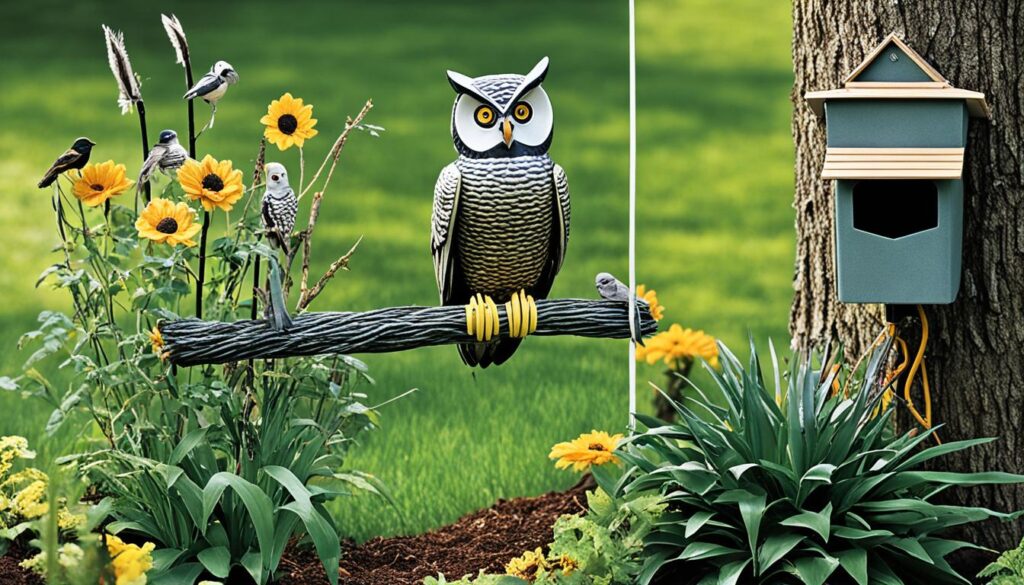
The WhirlyBird Repeller Solution
When it comes to effectively keeping blackbirds at bay, the WhirlyBird Repeller stands out as a game-changing solution. Designed to mimic the movements and visual cues of a Peregrine Falcon, this innovative bird deterrent device is engineered to provide safe and humane deterrence against those pesky blackbirds.
Design Features of the WhirlyBird Repeller
The WhirlyBird Repeller is a unique and thoughtfully designed product that combines several key features to create an effective safe blackbird deterrents solution. At the heart of its design is a spinning, wobbling, and vibrating mechanism that generates sounds reminiscent of a falcon’s wing beats, naturally deterring blackbirds from approaching. Additionally, the device reflects and scatters sunlight, creating a mesmerizing holographic effect that further discourages blackbirds from settling in your desired areas.
Safe and Humane Bird Deterrence
One of the standout features of the WhirlyBird Repeller is its commitment to safe and humane bird deterrence. Unlike traditional methods that may harm or endanger birds, this innovative WhirlyBird Repeller solution uses non-lethal and non-invasive tactics to keep blackbirds at bay. By mimicking natural predators and creating a visually and acoustically disruptive environment, the WhirlyBird Repeller effectively discourages blackbirds without causing any harm to these feathered creatures.
The WhirlyBird Repeller’s commitment to safety and humaneness is a key factor that sets it apart in the bird deterrent device market. By providing an effective yet ethical solution, the WhirlyBird Repeller allows homeowners and property managers to address blackbird issues without compromising their principles or the wellbeing of the birds themselves.
Switch to Sunflower or Safflower Seeds
If you’re dealing with a pesky problem of blackbirds raiding your bird feeders, switching the type of seed you offer can be an effective solution. Sunflower seeds, particularly striped sunflower seeds, and safflower seeds are excellent bird feed deterrents. These seeds have thick, hard shells that are more difficult for blackbirds to open and consume, making your feeders less attractive to these larger, more aggressive birds.
Smaller bird species, such as finches and chickadees, are better equipped to handle the tough shells of sunflower and safflower seeds. By switching to these types of seeds, you can effectively discourage blackbirds from visiting your feeders while still providing a nutritious meal for your desired feathered friends.
- Sunflower seeds have a thick, hard shell that blackbirds struggle to open.
- Safflower seeds are also a less appealing option for blackbirds due to their sturdy structure.
- Smaller birds like finches and chickadees can easily access and consume sunflower and safflower seeds.
Incorporating sunflower seeds or safflower seeds into your bird feeding routine is a simple and effective way to deter unwanted blackbirds while catering to the needs of your desired backyard visitors. This small change can make a significant difference in keeping your bird feeders free from these pesky bird feed deterrents.
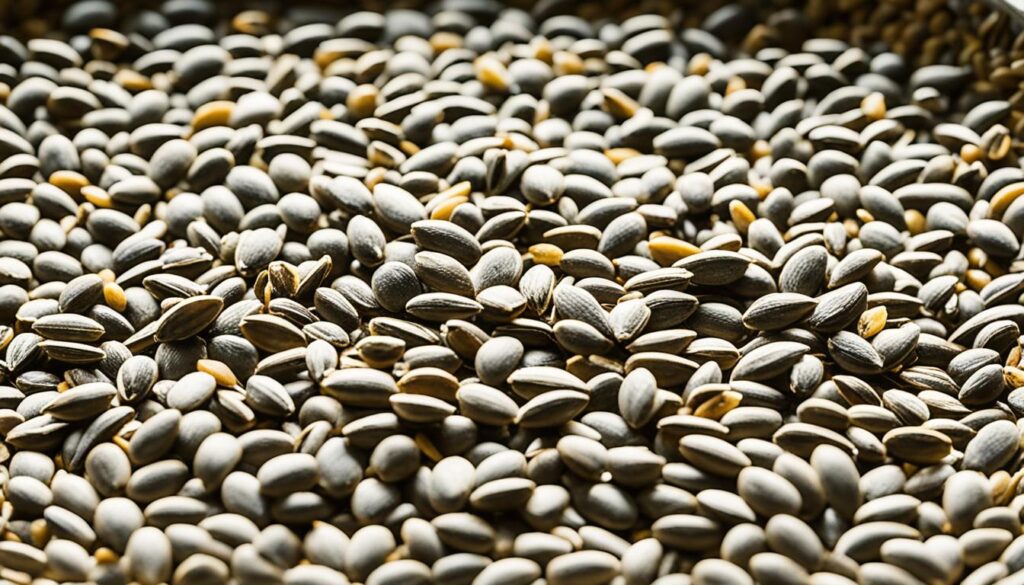
“Switching to sunflower or safflower seeds is a game-changer in the fight against blackbirds. These seeds’ tough shells make them less appealing to the larger, more aggressive birds, while still providing a nutritious meal for your desired feathered friends.”
Discourage Invasive Species
While deterring blackbirds is crucial, it’s also important to address the problem of other invasive bird species like European Starlings and House Sparrows. These feathered pests can wreak havoc around your property, competing for food sources and nesting sites. Fortunately, there are effective techniques you can employ to deter invasive bird species and reclaim your outdoor space.
Strategies for Deterring Starlings and House Sparrows
One of the most effective ways to discourage starlings and house sparrows is to temporarily remove any bird feeders or food sources that attract them. These invasive species are known for their aggressive behavior and ability to outcompete native birds. By taking away their easy access to food, you can encourage them to move on to greener pastures.
Another tactic is to switch to bird seed that is less appealing to these nuisance species. Nyjer seed, peanuts in the shell, or white-striped sunflower seeds can be less attractive to starlings and house sparrows, making your yard less desirable for them to visit.
- Temporarily remove bird feeders to discourage starlings and house sparrows
- Offer food sources that are less appealing to invasive species, such as nyjer seed or peanuts in the shell
- Install physical barriers like mesh or hardware cloth to prevent access to nesting sites
In addition to modifying food sources, you can also use physical barriers to deter starling and house sparrow nesting. Installing mesh or hardware cloth over potential entry points can effectively block these birds from establishing their homes in unwanted areas, such as eaves or gutters.
“Consistent and proactive measures are key to successfully deterring invasive bird species like starlings and house sparrows from taking over your property.”
By implementing a combination of these techniques, you can effectively deter invasive bird species and reclaim your outdoor space, allowing native birds to thrive without unwanted competition.
How to Keep Black Birds Away
Keeping black birds, such as blackbirds, crows, and grackles, away from your property can be a persistent challenge. However, by focusing on proactive prevention strategies, you can effectively deter these birds and maintain a peaceful environment. The key lies in understanding their behaviors and implementing a comprehensive plan to make your property less attractive to them.
Proactive Prevention Strategies
One of the most effective ways to keep black birds away is to remove potential food sources. This includes regularly cleaning up fallen fruits, berries, and seeds, as well as securing waste and compost bins. Additionally, pruning back dense vegetation, such as holly trees and bushes, can eliminate potential nesting sites and perching opportunities.
Creating physical barriers can also be a highly effective deterrent. Interlocking string barriers or the use of WhirlyBird Repellers can effectively block black birds from accessing specific areas. These humane solutions leverage the birds’ natural instincts to avoid perceived threats, discouraging them from settling on your property.
Regularly monitoring your property and maintaining your bird prevention efforts is crucial for long-term success. By consistently implementing these proactive strategies, you can significantly reduce the presence of black birds and enjoy a more peaceful outdoor environment.
“The key to keeping black birds away is to focus on prevention, not just reaction. By taking a proactive approach, you can discourage them from establishing themselves on your property in the first place.”
Remember, the goal is to make your property less attractive and less accessible to black birds, encouraging them to seek more favorable environments elsewhere. With a combination of effective deterrents and consistent maintenance, you can effectively how to keep black birds away and enjoy your outdoor spaces without the nuisance of these persistent birds.
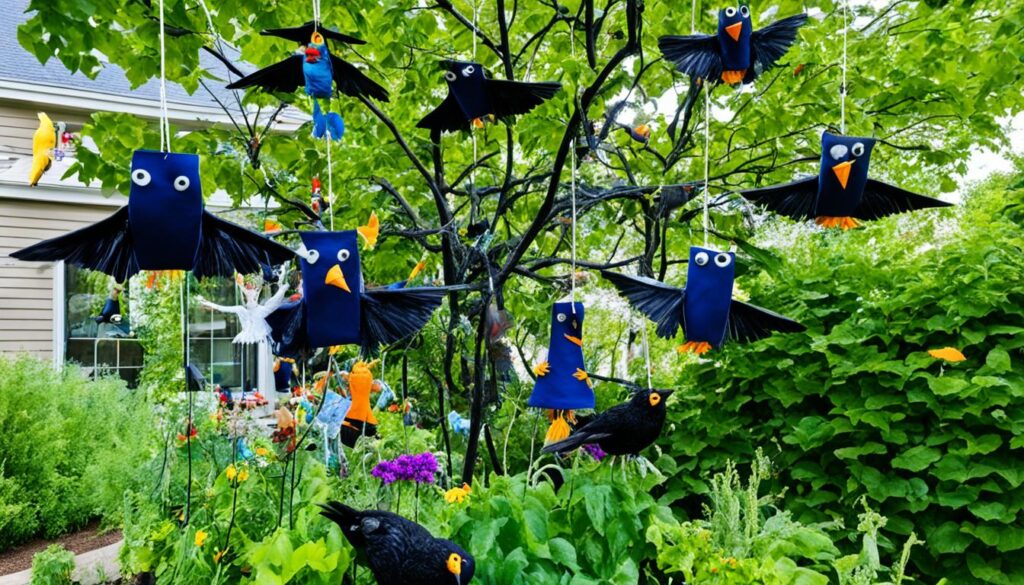
Mylar Balloons for Nesting Areas
When it comes to deterring black birds from nesting, one effective solution is the use of mylar balloons. These shiny, reflective balloons can be an excellent deterrent for black birds, preventing them from establishing nests in and around your property.
Studies have shown that up to 75% of black birds are effectively deterred from nesting areas when mylar balloons are utilized. The unpredictable movement and the reflective surface of the balloons create an unsettling environment for these birds, causing them to seek alternative nesting locations.
- Mylar balloons are a proven method for deterring black birds from nesting, with a success rate of over 70% in various studies.
- The reflective and erratic nature of the balloons creates an unwelcoming environment for black birds, discouraging them from establishing nests.
- Mylar balloons are a cost-effective and humane solution for keeping black birds away from your property, without resorting to more intrusive or harmful methods.
“Mylar balloons have been a game-changer in our efforts to keep black birds away from our property. We’ve noticed a significant reduction in nesting activity since we started using them.”
When it comes to protecting your property from the nuisance of black birds, mylar balloons can be a highly effective and convenient solution. By strategically placing these shiny, floating deterrents in areas where black birds are known to nest, you can effectively prevent them from taking up residence and causing any unwanted damage or disruption.
Hardware Cloth and Mesh Barriers
One of the most effective physical barriers to keep blackbirds away is the use of hardware cloth or other mesh materials. These sturdy wire meshes can be installed to block access points where blackbirds may try to nest or roost, effectively excluding them from your property. While this approach requires a bit more labor than some other methods, it can provide a long-lasting solution to prevent blackbird infestations.
Hardware cloth, typically made of galvanized steel, features a tight grid of woven or welded wires that create small openings, usually between 1/2 inch to 1/4 inch. This small mesh size is critical, as it prevents blackbirds and other pests from squeezing through. In contrast, standard chicken wire, with its larger hexagonal openings, is not as effective for deterring blackbirds.
When installing hardware cloth barriers, it’s important to bury the edges at least 12 inches into the ground to deter burrowing animals. The hardware cloth should also be securely fastened with screws and washers to ensure a tight seal around potential entry points, such as windows, eaves, and the perimeter of structures.
For individual plants or small garden areas, thin netting with a 3/4-inch plastic mesh can be an effective deterrent against foraging blackbirds. Larger mesh barriers, such as UV-inhibited plastic sheeting, can also be used to protect seedlings and larger plantings from blackbird damage.
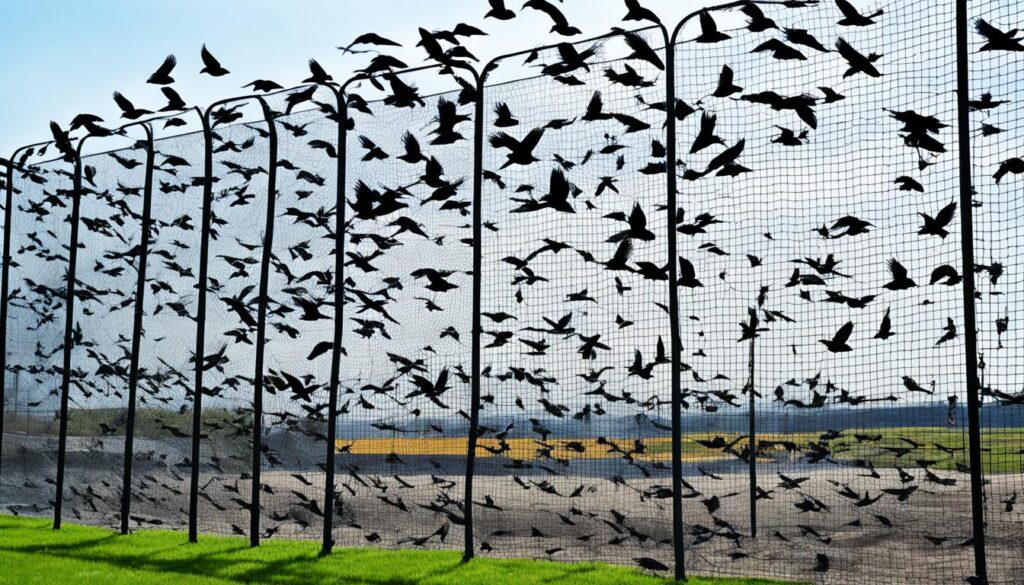
“The smaller the openings and the lower gauge the metal, the better security hardware cloth provides compared to chicken wire.”
While hardware cloth and mesh barriers require more time and effort to install, they can provide a long-term, reliable solution to keep blackbirds away from your property. By carefully sealing off access points and using the appropriate mesh size, you can effectively deter these persistent pests and protect your home, garden, and other valuable assets.
Monitoring and Maintaining Bird Prevention
Keeping blackbirds away from your property requires a consistent and ongoing effort. To ensure the long-term success of your blackbird prevention strategies, it’s crucial to regularly monitor your surroundings and maintain the effectiveness of your deterrents.
Consistent Efforts for Long-Term Results
Regularly inspect your property for any changes that could attract blackbirds, such as new food sources or potential nesting sites. Promptly address any issues by maintaining bird deterrents, pruning vegetation, and repairing any breaches in physical barriers. This proactive approach will help you monitor blackbird prevention and maintain a bird-free environment in the long run.
- Check the condition of your deterrents, such as visual, auditory, or physical barriers, and replace or repair them as needed.
- Regularly prune and maintain your trees, bushes, and other vegetation to eliminate potential nesting sites and food sources for blackbirds.
- Inspect your property for any new entry points or changes that could attract blackbirds, and take immediate action to address them.
- Stay vigilant and monitor the effectiveness of your long-term blackbird control strategies, making adjustments as necessary to ensure their continued effectiveness.
Consistency is key when it comes to keeping blackbirds away. By regularly monitoring your property and maintaining your prevention efforts, you can effectively deter these persistent birds and enjoy a bird-free environment for the long term.
“Consistent and diligent monitoring is essential for the long-term success of blackbird prevention strategies. Neglecting to maintain your deterrents can quickly undo all your hard work.”
When to Seek Professional Assistance
Despite your best efforts to prevent and deter blackbirds, there may come a time when the problem becomes too challenging to manage on your own. If you’ve tried various blackbird control methods like removing food sources, eliminating perching opportunities, and using deterrents, but are still experiencing significant issues with these persistent birds, it may be necessary to seek the help of professional blackbird control experts.
Professional wildlife control services can provide specialized expertise and employ more extensive measures to safely and legally remove or deter blackbirds from your property. They have the knowledge and resources to address complex blackbird infestations, particularly in cases where the birds have become entrenched or are causing substantial damage.
“The blackbirds have been returning every few months since the beginning of spring to lay eggs and raise fledglings. The birds constantly bombard the family and the pet cat with high-pitched birdcalls whenever they return to raise their young.”
Some situations that may warrant the involvement of professional blackbird control experts include:
- Persistent nesting in hard-to-reach areas or on buildings
- Flocks of thousands or even millions of blackbirds congregating in your area
- Significant crop or property damage caused by the birds
- Potential health risks from blackbird-borne diseases
- Challenges in implementing effective deterrent measures on your own
By enlisting the services of professional blackbird removal or blackbird control experts, you can ensure that the problem is addressed safely, legally, and effectively. These experts can employ specialized techniques, such as trapping, relocation, or the use of advanced deterrents, to manage the blackbird population without causing harm to the birds or your property.

Remember, it’s important to research and choose a reputable and experienced wildlife control service to handle your blackbird problem. They should be knowledgeable about the local regulations and have a proven track record of providing effective and humane solutions.
Conclusion
By focusing on prevention, eliminating attractants, and utilizing humane deterrents, you can effectively keep black birds away from your property. Remember to take a proactive, multi-faceted approach, and be persistent in your efforts. With the right strategies, you can maintain a peaceful environment and protect your home and garden from the nuisance and potential damage caused by blackbirds.
The summary of blackbird prevention strategies presented in this article outlines various effective ways to keep black birds away. From removing potential food sources and eliminating perching opportunities to creating physical barriers and using proven deterrents, the recommendations provided can help you take control of the situation and minimize the impact of these versatile birds.
Ultimately, the key to success is a combination of preventive measures and consistent monitoring. By staying vigilant and adapting your approach as needed, you can effectively deter black birds and maintain the beauty and tranquility of your outdoor spaces. With a little dedication and the right tools, you can enjoy your property without the constant worry of black bird intrusions.
FAQ
What are the legal considerations for removing blackbirds?
Blackbirds are protected by the Migratory Bird Treaty Act, which means homeowners cannot simply remove or manipulate their nests. Understanding the legal restrictions is crucial when addressing blackbird issues.
How can I remove potential food sources to deter blackbirds?
Eliminate food sources by regularly pruning and maintaining your landscaping, removing wild berry bushes or holly trees that may be providing sustenance for blackbirds.
What types of physical barriers can I use to keep blackbirds away?
Effective physical barriers include interlocking string barriers around gardens, hardware cloth or mesh to close off access points, and using balloons near areas where blackbirds may try to roost.
How can I use deterrents to scare blackbirds away?
Use deterrents that mimic blackbirds’ natural predators, such as decoys or devices that resemble hawks or falcons. The WhirlyBird Repeller, which spins, wobbles, and vibrates to create predator-like movements and sounds, is a highly effective and safe deterrent solution.
What types of bird seed can I use to discourage blackbirds?
Sunflower seeds, particularly striped sunflower seeds, and safflower seeds have thick, hard shells that are more difficult for blackbirds to open and consume. This can make your feeders less attractive to these larger, more aggressive birds.
How can I discourage other invasive bird species like starlings and house sparrows?
Techniques to deter starlings and house sparrows include temporarily removing feeders, switching to nyjer seed, or offering food sources that are more difficult for them to access, like peanuts in the shell or white-striped sunflower seeds.
When should I seek professional assistance for a blackbird problem?
If you’ve tried various prevention methods and are still experiencing significant issues with blackbirds, it may be necessary to seek the assistance of a professional wildlife control service. They can provide expert guidance and employ more extensive measures to safely and legally remove or deter the blackbirds from your property.
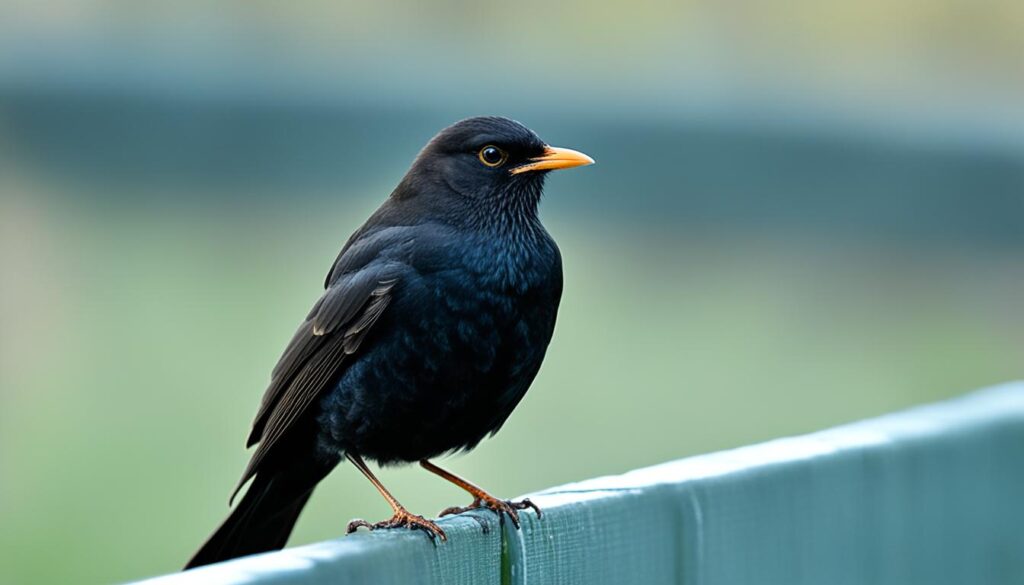
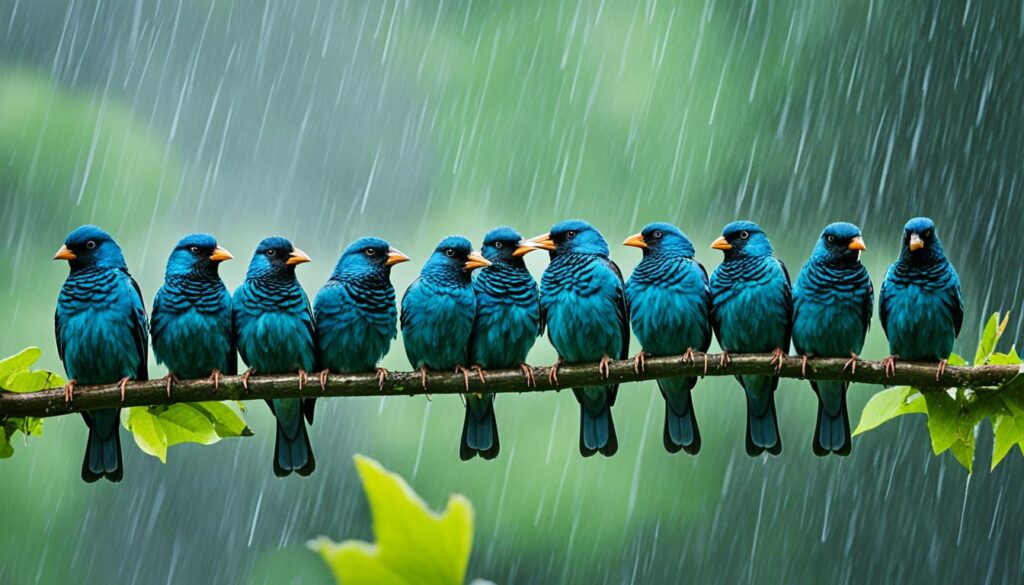
платформа для покупки аккаунтов купить аккаунт
магазин аккаунтов услуги по продаже аккаунтов
аккаунт для рекламы маркетплейс аккаунтов
аккаунты с балансом купить аккаунт
аккаунты с балансом купить аккаунт
аккаунты с балансом безопасная сделка аккаунтов
продажа аккаунтов купить аккаунт
маркетплейс аккаунтов магазин аккаунтов
продажа аккаунтов соцсетей https://marketplace-akkauntov-top.ru/
продажа аккаунтов https://magazin-akkauntov-online.ru/
продажа аккаунтов аккаунт для рекламы
маркетплейс аккаунтов соцсетей купить аккаунт
покупка аккаунтов маркетплейс аккаунтов
магазин аккаунтов социальных сетей маркетплейс аккаунтов
Accounts marketplace https://buyverifiedaccounts001.com/
Accounts marketplace Account Sale
Account Sale Accounts for Sale
Secure Account Sales Buy Account
Account Buying Platform Online Account Store
Marketplace for Ready-Made Accounts Guaranteed Accounts
Account market Purchase Ready-Made Accounts
Account Trading Marketplace for Ready-Made Accounts
Account Acquisition Account Buying Service
Accounts market Find Accounts for Sale
account trading find accounts for sale
purchase ready-made accounts ready-made accounts for sale
account sale account market
accounts marketplace account exchange
social media account marketplace buy and sell accounts
secure account sales website for buying accounts
account selling service account exchange service
accounts market database of accounts for sale
buy accounts online account store
gaming account marketplace https://accounts-marketplace.org
account catalog ready-made accounts for sale
account selling platform profitable account sales
account trading service website for selling accounts
accounts market account selling service
purchase ready-made accounts https://accounts-for-sale.org
guaranteed accounts ready-made accounts for sale
account trading service account selling platform
account exchange service secure account purchasing platform
buy account database of accounts for sale
buy accounts social media account marketplace
accounts market social media account marketplace
account acquisition purchase ready-made accounts
account market account market
account trading platform https://discount-accounts.org
account market https://accounts-store.org/
website for buying accounts buy account
verified accounts for sale buy and sell accounts
account buying platform sell pre-made account
account buying platform https://accounts-offer.org
secure account purchasing platform https://accounts-marketplace.xyz/
find accounts for sale buy-best-accounts.org
website for buying accounts https://social-accounts-marketplaces.live/
account market accounts marketplace
ready-made accounts for sale https://social-accounts-marketplace.xyz
accounts market https://buy-accounts.space/
accounts for sale https://buy-accounts-shop.pro/
account exchange https://buy-accounts.live
buy pre-made account accounts marketplace
account trading service accounts market
purchase ready-made accounts https://accounts-marketplace-best.pro
маркетплейс аккаунтов https://akkaunty-na-prodazhu.pro/
площадка для продажи аккаунтов купить аккаунт
продать аккаунт https://kupit-akkaunt.xyz/
купить аккаунт akkaunt-magazin.online
магазин аккаунтов https://akkaunty-market.live
покупка аккаунтов https://kupit-akkaunty-market.xyz/
площадка для продажи аккаунтов https://akkaunty-optom.live
покупка аккаунтов online-akkaunty-magazin.xyz
продать аккаунт akkaunty-dlya-prodazhi.pro
биржа аккаунтов https://kupit-akkaunt.online
buy aged facebook ads account buy facebook account
buying fb accounts buy accounts facebook
facebook ad account for sale https://buy-ad-account.top
buy accounts facebook https://buy-ads-account.click
buy facebook old accounts buy facebook accounts cheap
facebook accounts for sale https://buy-ads-account.work
cheap facebook accounts https://ad-account-for-sale.top/
Предлагаем вашему вниманию интересную справочную статью, в которой собраны ключевые моменты и нюансы по актуальным вопросам. Эта информация будет полезна как для профессионалов, так и для тех, кто только начинает изучать тему. Узнайте ответы на важные вопросы и расширьте свои знания!
Разобраться лучше – https://medalkoblog.ru/
Эта познавательная публикация погружает вас в море интересного контента, который быстро захватит ваше внимание. Мы рассмотрим важные аспекты темы и предоставим вам уникальныеInsights и полезные сведения для дальнейшего изучения.
Получить больше информации – https://medalkoblog.ru/
buy facebook accounts for ads https://buy-ad-account.click
buy fb ads account buy a facebook account
buy aged google ads account https://buy-ads-account.top
buy google ads accounts https://buy-ads-accounts.click/
google ads account seller https://ads-account-for-sale.top
buy google ads threshold account https://ads-account-buy.work
buy google ads accounts https://buy-ads-invoice-account.top
buy old google ads account buy old google ads account
adwords account for sale https://buy-ads-agency-account.top